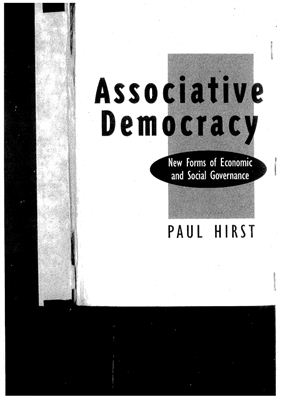University of Massachusetts Press, 1994. - 222 p.
In this book Paul Hirst makes a major contribution to democratic thinking, advocating "associative democracy"; the belief that human welfare and liberty are best served when as many of the affairs of society as possible are managed by voluntary and democratically self–goveing associations. Representative govement and corporate bureaucracy have dominated the 20th century. In this book Paul Hirst has the bold ambition of reviving the alteative 19th century traditions of pluralism, co–operation and voluntary association to complement if not replace them. But he modifies these alteatives both in theory and by reference to recent institutional experiment. It is an attractive prospect, delineated with force and leaing.
In this book Paul Hirst makes a major contribution to democratic thinking, advocating "associative democracy"; the belief that human welfare and liberty are best served when as many of the affairs of society as possible are managed by voluntary and democratically self–goveing associations. Representative govement and corporate bureaucracy have dominated the 20th century. In this book Paul Hirst has the bold ambition of reviving the alteative 19th century traditions of pluralism, co–operation and voluntary association to complement if not replace them. But he modifies these alteatives both in theory and by reference to recent institutional experiment. It is an attractive prospect, delineated with force and leaing.

